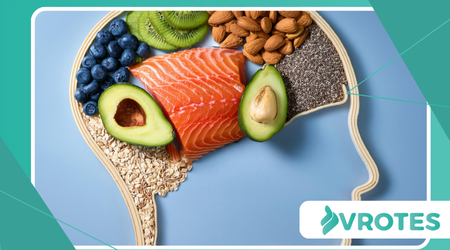Menopause and Memory: Foods That Support Cognitive Function

menopause and memory. Menopause isn’t just about hot flashes and mood swings; it’s a systemic transformation.
Anúncios
The decline in estrogen, a hormone with widespread influence, directly impacts brain health. Estrogen plays a crucial role in neurotransmitter production and overall neural plasticity.
When estrogen levels drop, the brain’s ability to form new connections and maintain existing ones can be compromised.
This can manifest as difficulty recalling names, struggling to find words, or even a general sense of mental sluggishness. It’s a real phenomenon, not just a figment of imagination.
Understanding this link is the first step toward proactive management. We can’t stop menopause, but we can certainly mitigate its effects on our minds.
Anúncios
Our dietary choices emerge as powerful allies in this endeavor, offering a natural pathway to support cognitive vitality.
Think of your brain like a high-performance engine. Just as a car needs the right fuel to run smoothly, your brain thrives on specific nutrients.
Without them, even the most robust engine will sputter and falter, especially during periods of increased demand, like menopause.
Fueling Your Brain: Essential Nutrients
Certain nutrients are particularly vital for brain health during menopause. These act as building blocks, protectors, and facilitators of cognitive processes.
Prioritizing them in your diet can make a tangible difference in your daily mental clarity.
Omega-3 fatty acids, for instance, are non-negotiable. They are crucial components of brain cell membranes, directly influencing communication between neurons.
Found abundantly in fatty fish, these healthy fats are like the superhighways for your brain’s information flow.
Antioxidants are another powerhouse group. They combat oxidative stress, a process that damages brain cells and accelerates cognitive decline.
Read more: DIY Cooling Mist Recipes to Beat Hot Flashes
Berries, dark leafy greens, and colorful vegetables are packed with these protective compounds.
Vitamins B, especially B6, B9 (folate), and B12, are essential for nerve function and the production of neurotransmitters.
A deficiency in these vitamins can lead to fatigue, irritability, and, notably, impaired memory. Ensuring adequate intake is a simple yet effective strategy.
Minerals like magnesium and zinc also play critical roles. Magnesium supports nerve transmission and brain energy metabolism, while zinc is involved in synaptic plasticity and learning.
These tiny elements have outsized impacts on cognitive performance.

Power Foods for Cognitive Support
Let’s dive into specific foods that can actively support your brain during menopause. Incorporating these into your regular diet can be a delicious and effective strategy for maintaining sharp cognitive function.
These aren’t exotic ingredients; they’re accessible and versatile.
Salmon, mackerel, sardines, and trout are rich in DHA and EPA, the most beneficial omega-3s.
Fatty Fish: Aim for at least two servings per week. A simple grilled salmon with a side of steamed vegetables is a perfect brain-boosting meal.
Berries: Blueberries, strawberries, raspberries, and blackberries are bursting with antioxidants, particularly flavonoids.
These compounds have been shown to improve memory and slow cognitive decline. Toss them into your yogurt or oatmeal for an easy win.
Read here: How to Track Hormone Patterns to Predict Symptom Flare‑Ups
Leafy Green Vegetables: Spinach, kale, and collard greens are excellent sources of vitamin K, lutein, folate, and beta-carotene.
These nutrients are linked to slower cognitive decline. Think of a vibrant salad or a green smoothie as a daily brain investment.
Nuts and Seeds: Walnuts, almonds, chia seeds, and flaxseeds provide healthy fats, vitamin E, and antioxidants.
Walnuts, in particular, are rich in alpha-linolenic acid (ALA), another omega-3 fatty acid. A handful of mixed nuts is a great snack.
Whole Grains: Oats, quinoa, brown rice, and whole-wheat bread provide a steady supply of glucose, the brain’s primary fuel.
They also contain B vitamins and fiber, which help regulate blood sugar, preventing energy dips that can affect focus.
Avocados: These creamy fruits are packed with monounsaturated fats, which promote healthy blood flow to the brain.
They also contain vitamin K and folate, both beneficial for cognitive function. Avocado toast isn’t just trendy; it’s smart.
Dark Chocolate: Yes, good news! Dark chocolate (at least 70% cocoa) is rich in flavonoids and antioxidants.
These can improve blood flow to the brain and enhance cognitive function. Enjoy a small piece as a healthy treat.
++ Combining Reiki and Breathwork for Hormonal Harmony
Eggs: A versatile source of choline, a precursor to acetylcholine, a neurotransmitter crucial for memory and learning.
Eggs also provide B vitamins. Start your day with scrambled eggs or a veggie-filled omelet.

Beyond Food: Lifestyle for a Sharp Mind
While food is paramount, a holistic approach to managing menopause and memory is most effective. Lifestyle factors play a significant role in cognitive health, working synergistically with your dietary choices.
Regular physical activity, for instance, boosts blood flow to the brain, promotes the growth of new brain cells, and reduces inflammation.
Even moderate exercise, like brisk walking for 30 minutes most days, can make a difference. It’s not just about physical fitness; it’s about brain fitness.
Quality sleep is another non-negotiable. During sleep, your brain consolidates memories and clears out metabolic waste.
Chronic sleep deprivation can profoundly impair cognitive function. Aim for 7-9 hours of restful sleep nightly.
Stress management is also critical. Chronic stress can lead to inflammation and damage brain cells. Practices like meditation, yoga, or even spending time in nature can help mitigate its negative effects. Finding your calm helps your brain stay sharp.
Engaging in mentally stimulating activities keeps your brain agile. Learn a new language, pick up a musical instrument, solve puzzles, or read challenging books.
Your brain, like a muscle, benefits from regular exercise.
Real-World Examples and an Insightful Statistic
Consider Sarah, a 52-year-old marketing executive who found herself increasingly frustrated by “brain fog” during meetings.
After incorporating more fatty fish, berries, and leafy greens into her diet, along with daily walks, she noticed a remarkable improvement in her focus and recall within a few months.
Her colleagues even commented on her renewed sharpness.
Another example is Maria, a 55-year-old teacher who felt her memory slipping, making lesson planning a struggle.
She started a regimen of daily whole-grain breakfasts, regular intake of nuts, and committed to learning a new skill: painting.
She found her cognitive clarity not only returned but often felt sharper than before menopause.
A study published in the journal Neurology in 2021 found that women who consumed a diet rich in plant-based foods, including fruits, vegetables, and whole grains, had a significantly lower risk of cognitive impairment over time.
Specifically, it highlighted that those with higher adherence to a plant-based diet showed an average of 17% less cognitive decline compared to those with lower adherence.
This underscores the power of a predominantly whole-food, plant-forward approach.
| Food Group | Key Nutrients | Cognitive Benefits |
| Fatty Fish | Omega-3s (DHA, EPA) | Neuronal communication, anti-inflammation |
| Berries | Antioxidants (Flavonoids) | Improved memory, slowed decline |
| Leafy Greens | Vitamin K, Folate | Slower cognitive decline, nerve health |
| Nuts & Seeds | Healthy fats, Vit. E | Brain cell protection, antioxidant support |
| Whole Grains | B Vitamins, Fiber | Stable energy, neurotransmitter support |
The Power of Proactivity
Navigating menopause and memory challenges doesn’t mean resigning yourself to cognitive decline. It’s an invitation to embrace proactive health strategies.
Just as a gardener carefully tends to their plants, ensuring they receive the right soil, water, and sunlight, we must nurture our brains with the optimal nutrients and lifestyle choices.
Can we truly reverse the aging process? Perhaps not entirely, but we can certainly optimize our internal environment.
The food we eat directly fuels our brain cells, influencing their function and resilience. Every bite is an opportunity to invest in your cognitive future.
Why wait until severe symptoms arise when you can lay a foundation of brain health today? Taking charge of your diet is one of the most empowering steps you can take.
It’s an act of self-care that pays dividends in mental clarity and overall well-being.
The connection between menopause and memory is complex, but our dietary choices offer a powerful and accessible pathway to support cognitive function.
By prioritizing nutrient-dense foods, adopting healthy lifestyle habits, and understanding the brain’s needs during this transitional phase, women can significantly mitigate cognitive challenges.
You have the power to influence your brain health directly through what you put on your plate. Empower yourself with knowledge and nourish your mind for a sharper, more vibrant future.
Frequently Asked Questions
Will these foods completely eliminate memory issues during menopause?
While these foods can significantly support and improve cognitive function, they may not completely eliminate all memory issues.
Menopause is a complex process. Diet is a powerful tool, but it’s part of a holistic approach that includes lifestyle factors and sometimes medical support.
How quickly can I expect to see results from changing my diet?
The timeline for results varies for everyone.
Some women report noticing improvements in focus and clarity within a few weeks to a few months of consistently adopting a brain-healthy diet. Consistency is key.
Are there any supplements I should consider for menopause and memory?
While whole foods are always best, certain supplements like Omega-3 fatty acids, B vitamins, and magnesium can be beneficial if dietary intake is insufficient.
Always consult with a healthcare professional before starting any new supplement regimen.
Can male hormones or other conditions also affect memory like menopause does?
Yes, while menopause is specific to women, hormonal changes in men (andropause) and other health conditions like thyroid issues, stress, or certain medications can also impact memory and cognitive function in both sexes.
Is it too late to start a brain-healthy diet if I’m already past menopause?
Absolutely not! It’s never too late to adopt a brain-healthy diet. While prevention is ideal, your brain is remarkably adaptable.
You can still experience significant benefits in cognitive function and overall well-being by making positive dietary and lifestyle changes at any age.
